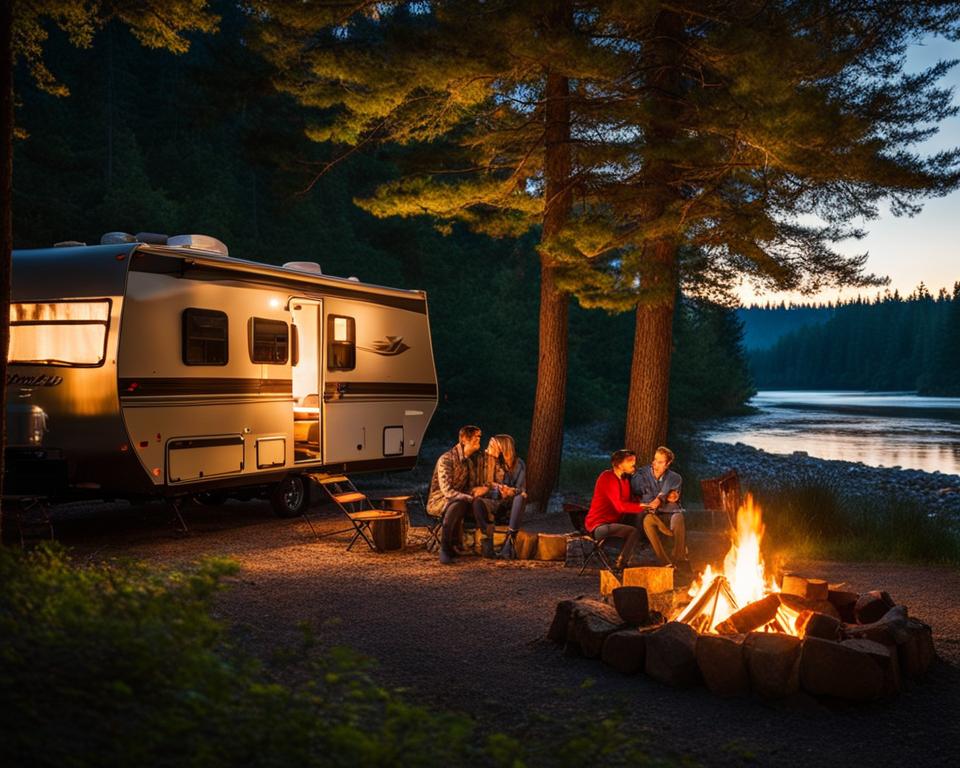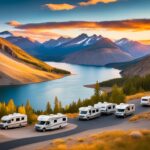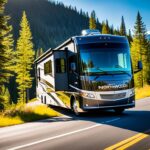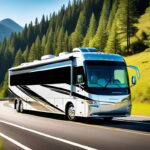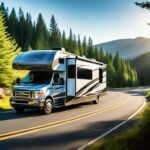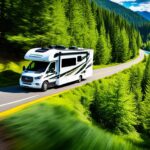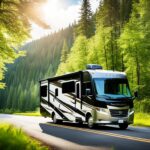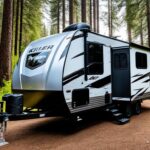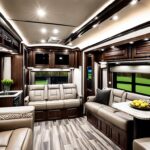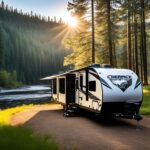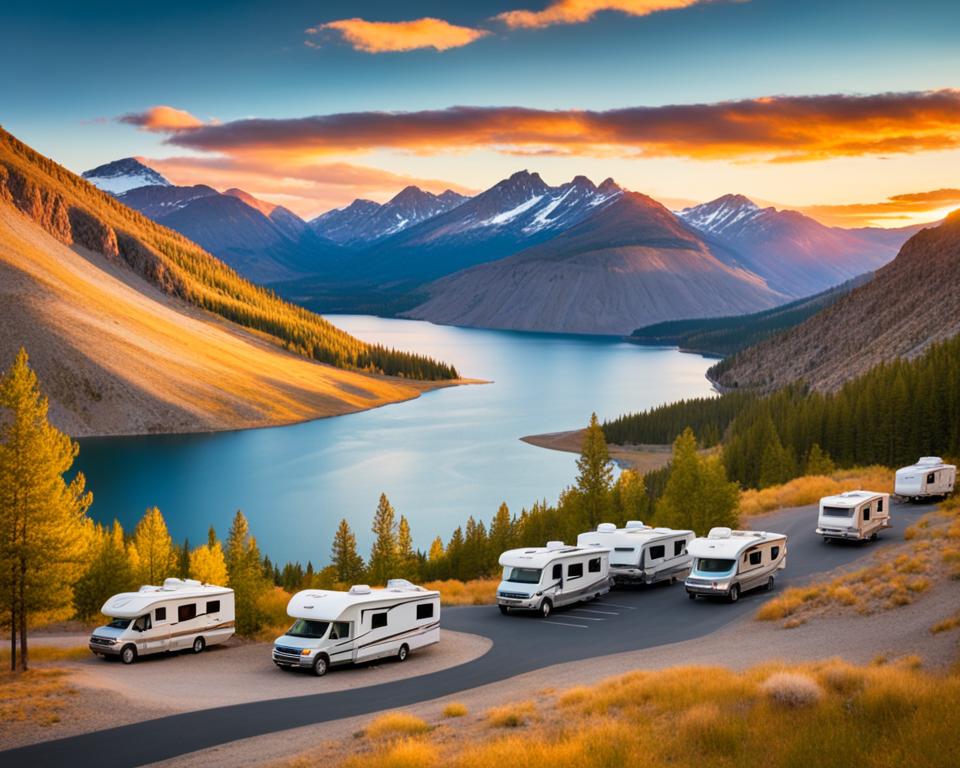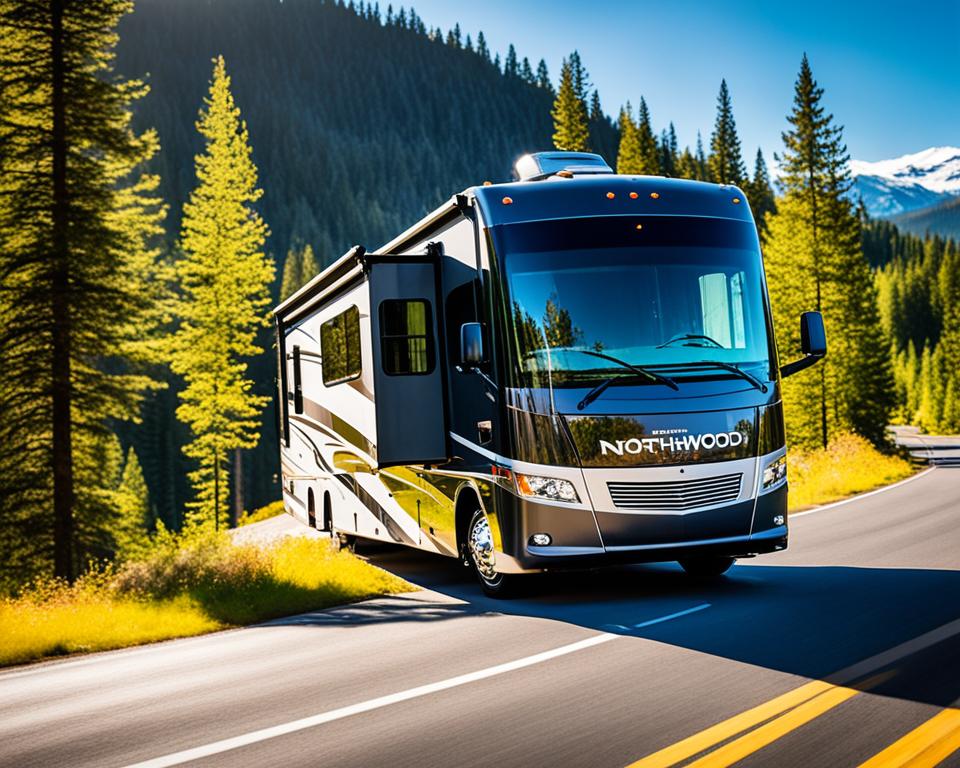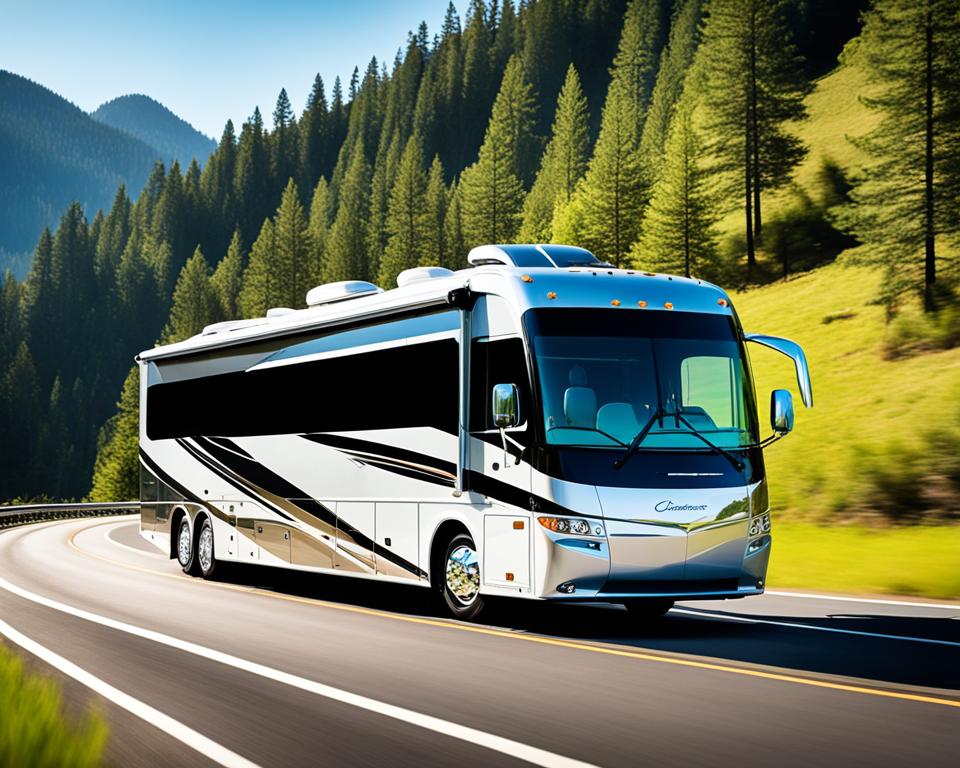Thinking of renting a recreational vehicle? There are few better ways to take in the sights than by hitting the road in a campervan or recreational vehicle (RV). Each type of RV offers different options for sleeping, cooking, dining, and comfort. In this guide, we will take an in-depth look at the different types of recreational vehicles and campervans available, their features, pros, and cons, to help you make the perfect rental choice for your next adventure.
Key Takeaways:
- Recreational vehicles and campervans offer a unique way to explore the open road and enjoy the freedom of a home on wheels.
- There are different types of RVs, including campervans, motorhomes, and 4WD campers, each offering its own set of features and amenities.
- Consider your budget, travel needs, and desired amenities when choosing the right rental vehicle.
- Follow safety tips and plan ahead to make the most of your RV or campervan adventure.
- Embark on an unforgettable journey and discover the joys of traveling in a recreational vehicle or campervan.
Station Wagon
The station wagon is a simple and low-cost option for one or two travelers or a small group. It can comfortably seat up to five people and offers plenty of storage space for luggage.
During the day, the back can be used to store supplies, and at night, it can be converted into a double bed. While there is no fridge or sink, you can easily travel with cooking gear and even set up a tent for sleeping.
This is a cost-effective option for travelers on a budget who want to save on rental costs and overnight parking.
| Pros | Cons |
|---|---|
| Low-cost option | No fridge or sink |
| Plenty of storage space | No built-in sleeping area |
| Simple and easy to drive | No built-in amenities |
| Can seat up to five people | May require setting up a tent for sleeping |
Overall, the station wagon is a convenient and affordable option for travelers who prefer a simple and compact vehicle with ample storage space.
Campervan
A campervan is another popular option for hitting the road. These compact vans are outfitted with furnishings, storage space, and sleeping areas. Some campervans even include kitchenettes, showers, and toilets. There are two main types of campervans: low top and high top. Low top campervans are smaller and more budget-friendly, usually sleeping two people. High top campervans offer more space, better amenities, and can sleep up to five people. Campervans are a budget-friendly alternative to motorhomes and are suitable for small groups, pairs, or individual travelers.
When it comes to exploring the great outdoors, a campervan provides the perfect blend of convenience, comfort, and affordability. These compact vehicles are specifically designed to offer a compact and self-contained living space, making them an ideal choice for those seeking a more immersive and flexible travel experience.
With a campervan, travelers can enjoy the freedom of the open road while still having access to essential amenities such as a kitchenette, sleeping space, and storage options. Whether you’re embarking on a weekend getaway or a longer road trip, a campervan provides the perfect balance between mobility and comfort.
One of the main advantages of choosing a campervan is its compact size. Unlike larger motorhomes, campervans are smaller and easier to maneuver, making them ideal for navigating narrow roads and tight spaces. This makes them a popular choice for travelers who prefer off-the-beaten-path adventures and remote camping locations.
Kitchenette and Sleeping Space
One of the standout features of a campervan is its built-in kitchenette. This compact cooking area is equipped with essential appliances and utensils, allowing travelers to prepare their own meals on the go. From quick snacks to gourmet creations, a campervan’s kitchenette provides the flexibility and convenience of home cooking while traveling.
Additionally, campervans offer ample sleeping space for a restful night’s sleep. Depending on the size and layout of the vehicle, campervans can comfortably accommodate two to five people. The sleeping areas are cleverly designed to maximize space while ensuring a comfortable and cozy atmosphere.
Budget-Friendly Option
Campervans are an excellent budget-friendly option for travelers looking to explore the open road without breaking the bank. Compared to larger motorhomes, campervans are more affordable to rent and operate, making them an ideal choice for budget-conscious adventurers.
Furthermore, campervans offer the benefit of lower fuel consumption, allowing travelers to save on transportation costs during their journey. With a campervan, you can allocate more of your budget towards experiences and attractions, making the most of your adventure.
Whether you’re embarking on a solo trip, a romantic getaway, or a small group adventure, a campervan provides an excellent balance of comfort, convenience, and affordability. With their compact size, equipped kitchenettes, and comfortable sleeping areas, campervans offer a unique and immersive way to experience the joys of road travel.
Next, we will explore another type of recreational vehicle that offers even more luxury and comfort – the motorhome.
Motorhome
If you’re looking for more luxury and comfort, a motorhome is the way to go. These larger vehicles offer more space, amenities, and features compared to campervans. Motorhomes have everything you need for a comfortable journey, including a fully functional kitchenette, a toilet, a shower, and plenty of storage space. They are like a home on wheels and provide the highest level of comfort and convenience. Motorhomes are suitable for larger groups, travelers with bigger budgets, and those who want to feel at home on the road.
Features of a Motorhome
A motorhome is designed to provide the ultimate luxury and convenience on your travels. Here are some key features you can expect:
- Fully Functional Kitchenette: Enjoy the freedom to cook your own meals with a motorhome’s equipped kitchenette. Prepare delicious meals just like you would at home.
- Toilet and Shower: Avoid the inconvenience of public restrooms with a motorhome’s built-in toilet and shower. You can freshen up and enjoy privacy wherever you go.
- Ample Storage Space: Motorhomes offer plenty of storage space to keep your belongings organized. With designated areas for clothes, food, and equipment, you can easily find what you need.
- Comfortable Sleeping Areas: Rest and recharge in the motorhome’s comfortable sleeping areas. Whether it’s a cozy bed or fold-out couch, you can get a good night’s sleep after a day of adventure.
- Privacy: Enjoy the privacy of your own space in a motorhome. You don’t have to worry about sharing communal facilities or noisy neighbors.
A motorhome provides a luxurious and comfortable experience, allowing you to travel in style. It offers the perfect blend of functionality and convenience, making it the ideal choice for those who crave the comforts of home while on the road.
4WD Camper
For those looking for an off-road adventure, a 4WD camper is the perfect choice. These vehicles are designed to tackle rough terrains and provide the freedom to explore remote locations. Some 4WD campers include expandable tents and pop-up roofs for additional sleeping space and storage. Outdoor cooking gear is also included in many 4WD campers. With a 4WD camper, you can travel on roads that are inaccessible to motorhomes or standard campervans. This is an ideal option for individuals, couples, or small groups who want to experience the thrill of off-roading in Australia’s outback.
Benefits of a 4WD Camper:
- Ability to navigate rough terrains and explore remote locations
- Expandable tents and pop-up roofs provide extra sleeping space and storage
- Included outdoor cooking gear for convenient meals on the go
- Access to roads inaccessible to standard campervans and motorhomes
“A 4WD camper is the ultimate choice for adventurers seeking the thrill of off-roading and remote exploration.” – [Insert Real Name], Adventurer
Whether you’re planning an off-roading adventure or simply prefer the freedom of exploring remote locations, a 4WD camper offers the perfect combination of ruggedness and comfort. With its sleeping space, cooking gear, and ability to conquer challenging terrains, a 4WD camper allows you to embark on unforgettable journeys to the most breathtaking destinations.
Factors to Consider Before Renting an RV or Campervan
Before embarking on your RV or campervan adventure, it’s important to consider several factors to ensure a smooth and enjoyable experience. By taking these considerations into account, you can select the perfect rental vehicle that meets your needs and preferences.
- Size and Accommodation: Evaluate the size of the RV or campervan and determine how many people it needs to accommodate. Consider the number of beds and seating areas to ensure everyone has enough space for a comfortable journey.
- Budget: Determine your budget for the rental, including not only the cost of the vehicle itself but also additional expenses such as fuel, insurance, and campground fees. Be realistic about what you can afford to ensure a stress-free trip.
- Amenities: Decide what amenities are essential for your travel experience. Do you need a kitchenette to prepare meals on the go? Will a toilet and shower facilities be necessary, or are you comfortable using campground facilities? Consider your comfort and convenience requirements.
- Travel Plans: Think about the type of travel you plan to do. If you aim to explore off-road destinations or go on an adventurous journey, consider renting a 4WD camper that is designed for rough terrains. If you prefer a more leisurely experience, a motorhome or campervan may be a better fit.
- Rental Companies: Research different RV and campervan rental companies, comparing prices, rental terms, and customer reviews. Ensure that the company you choose is reputable, reliable, and offers excellent customer service.
By carefully considering these factors, you can make an informed decision when renting an RV or campervan that aligns with your needs and preferences.
Always remember to plan ahead and make reservations for campsites or RV parks to secure your accommodations along the way. This ensures that you have a place to park and stay overnight, especially during peak travel seasons when availability may be limited.
Customer Testimonial:
“Considering the size, budget, and amenities I needed, I decided to rent a campervan for my road trip. It had a small kitchenette, and I could easily find campsites for parking overnight. It was the perfect choice for a solo traveler like me!”
Comparison of RV and Campervan Rental Companies:
| Company | Price Range | Customer Ratings (out of 5) |
|---|---|---|
| Campervan Rentals | $70-$150 per day | 4.8 |
| RV City | $100-$200 per day | 4.6 |
| Wanderlust Adventures | $120-$250 per day | 4.9 |
| Great Escapes RV | $90-$180 per day | 4.7 |
RV Safety and Maintenance Tips
Safety is of utmost importance when driving an RV or campervan. Whether you’re a seasoned driver or new to handling larger vehicles, it’s essential to develop the necessary driving skills to ensure a safe journey. Practice maneuvering techniques such as parking, backing up, and making wide turns to become comfortable behind the wheel.
Regularly inspecting your RV’s tires is crucial for maintaining safety on the road. Check the tire pressure and ensure it is properly inflated to prevent accidents and ensure optimal handling. Monitor tire wear and replace them as needed to maintain traction and stability.
If you’re looking to enhance safety features in your RV, consider upgrading to a vehicle equipped with advanced technologies. Backup cameras can assist with parking and reversing, providing added visibility. Electronic stability control helps maintain control during sudden maneuvers, while automatic emergency braking offers an extra layer of protection in critical situations.
Proper maintenance is vital to keep your RV in top shape. Schedule regular servicing and adhere to the manufacturer’s recommended maintenance intervals. Check fluid levels, including engine oil, coolant, and brake fluid, to ensure they are at appropriate levels for optimal performance.
Don’t forget to inspect the overall condition of your vehicle, both inside and out. Look for signs of wear and tear, leaks, or any other issues that may require attention. By addressing maintenance needs promptly, you can prevent costly repairs and ensure a smooth and problem-free journey.
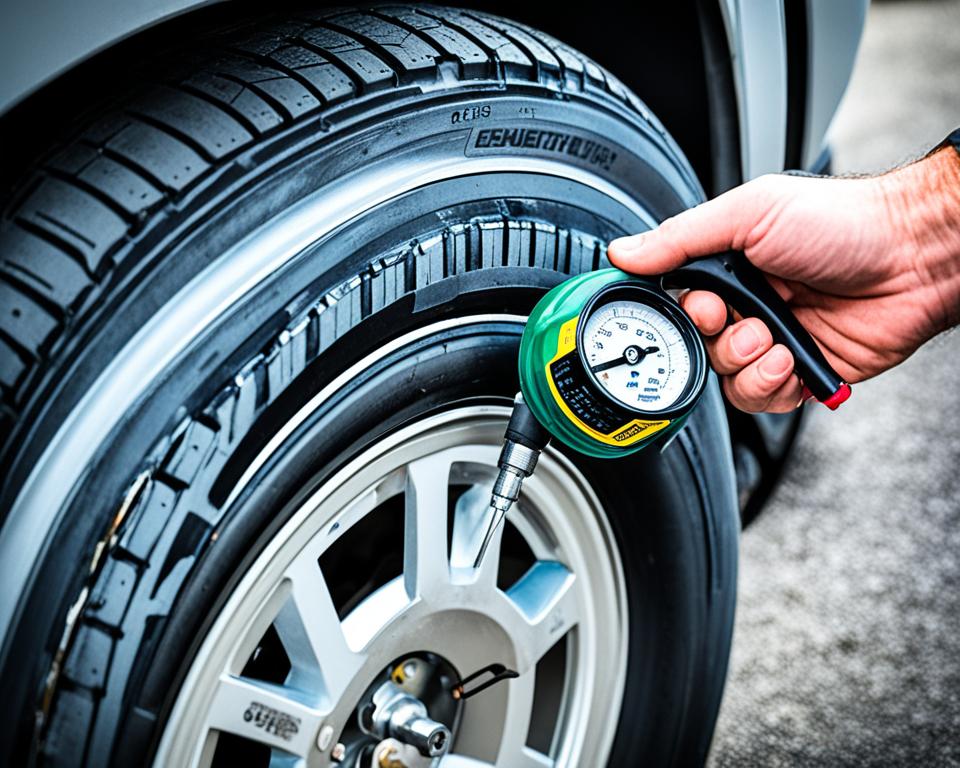
| RV Safety and Maintenance Checklist | Frequency |
|---|---|
| Check tire pressure and wear | Before every trip |
| Inspect brakes and brake fluid | Every 6 months or as recommended |
| Test headlights, taillights, and turn signals | Before every trip |
| Clean and inspect the RV’s exterior | Every 3 months or as needed |
| Check fluid levels (oil, coolant, brake fluid) | Before every trip |
| Verify propane system and detectors | Every 6 months or as recommended |
RV Travel During the Pandemic
RV travel has become increasingly popular during the COVID-19 pandemic due to its inherent social distancing capabilities. Whether you’re a seasoned RV enthusiast or new to the world of recreational vehicles, renting an RV allows you to explore while maintaining a safe distance from others.
When traveling in an RV, you have the freedom to use your own bathroom facilities and cook your own meals, minimizing contact with public spaces. This self-contained travel option provides an extra layer of protection and peace of mind for those concerned about their health and safety.
However, it is crucial to stay informed and follow applicable guidelines from trusted sources such as the CDC, federal, and state authorities. Before embarking on your RV adventure, take these necessary precautions:
- Research travel restrictions: Check for any travel restrictions, border closures, or quarantine requirements in your intended destination. Stay updated on the latest guidelines to ensure a smooth and hassle-free journey.
- Verify park and attraction closures: Some popular parks and attractions may have limited capacity or be temporarily closed. Double-check their operational status before planning your itinerary to avoid any disappointments.
- Confirm availability of amenities at RV parks: While RV parks have been deemed essential services, individual facilities may have specific guidelines or restrictions in place. Contact the parks you plan to visit in advance to ensure that their amenities, such as showers, laundry facilities, and recreational areas, are open and accessible.
- Plan ahead and stock up on provisions: To minimize unnecessary stops and potential exposure, plan your meals and stock up on food, beverages, and essentials before hitting the road. This way, you can optimize your time spent in nature and limit interactions with crowded supermarkets or restaurants.
- Follow social distancing guidelines: Even while traveling in your RV, it is important to practice social distancing whenever interacting with others outside your travel party. Be mindful of maintaining at least six feet of distance, wearing masks when necessary, and avoiding crowded areas.
By adhering to these precautions and planning ahead, you can enjoy the freedom and flexibility of RV travel while keeping yourself and others safe. Remember, your health and well-being should always be a top priority, and responsible travel practices can help ensure a memorable and worry-free journey.
Now, let’s dive deeper into the different types of motorhomes in Section 9: Types of Motorhomes: A Breakdown.
Types of Motorhomes: A Breakdown
Motorhomes offer a variety of options for travelers seeking the perfect mobile accommodation. They are classified into three main types: Class A, Class B, and Class C.
Class A Motorhomes
Class A motorhomes are the largest and most luxurious option. Resembling buses, they provide ample space and top-of-the-line features. Class A motorhomes are equipped with all the amenities needed for a comfortable journey, including fully-functional kitchens, bathrooms, and plenty of storage space. These motorhomes are perfect for travelers who desire the utmost in luxury and convenience.
Class B Motorhomes
Class B motorhomes, also known as camper vans, are compact in size but pack a lot of features. They offer a comfortable living space designed to make the most of the available area. Class B motorhomes are equipped with essential amenities such as sleeping quarters, a kitchenette, and storage space. These motorhomes are ideal for individuals or couples looking for a cozy and versatile travel experience.
Class C Motorhomes
Class C motorhomes are a middle ground between Class A and Class B. They strike a balance between size, features, and affordability. Class C motorhomes have a distinctive cab-over design, providing additional space for sleeping or storage. They often feature amenities such as a kitchenette, bathroom, and sleeping areas. These motorhomes are a popular choice for families and larger groups due to their versatility and comfortable accommodations.
When choosing the right motorhome for your travels, consider factors such as your budget, desired features, and the number of people you need to accommodate. Each class offers its own unique design and features, allowing you to find the perfect motorhome that suits your needs and preferences.
Below is a table summarizing the key differences and features of each motorhome class:
| Motorhome Class | Size | Features |
|---|---|---|
| Class A | Largest | Spacious, luxurious, fully-functional kitchen, bathroom |
| Class B | Compact | Cozy, versatile, kitchenette, sleeping quarters |
| Class C | Middle ground | Spacious, cab-over design, kitchenette, bathroom |
Choose the motorhome class that best fits your travel needs and embark on an unforgettable RV adventure.
Conclusion
Recreational vehicles (RVs) and campervans provide an exciting and adventurous way to embark on an unforgettable journey. Whether you opt for a station wagon, campervan, motorhome, or 4WD camper, you’ll have the freedom and comfort of a home on wheels. When selecting your ideal rental vehicle, consider your budget, travel needs, and desired amenities to ensure a perfect fit.
Don’t forget to prioritize safety by following the provided tips and guidelines. Plan ahead, make reservations for campsites or RV parks, and conduct regular maintenance checks for a worry-free journey. By doing so, you can make the most of your RV or campervan adventure and fully immerse yourself in the wonders of the open road.
With this ultimate guide, you’re equipped with all the necessary knowledge to embrace the spirit of adventure travel. So pack your bags, gather your loved ones, and set off on an incredible journey with your chosen recreational vehicle. Happy travels!
FAQ
What are the different types of recreational vehicles and campervans available?
The different types of recreational vehicles and campervans available include station wagons, campervans, motorhomes, and 4WD campers.
What is a station wagon?
A station wagon is a simple and low-cost option for one or two travelers or a small group. It offers seating for up to five people and ample storage space for luggage.
What is a campervan?
A campervan is a compact van outfitted with furnishings, storage space, and sleeping areas. It can include kitchenettes, showers, and toilets.
What is a motorhome?
A motorhome is a larger vehicle that offers more space, amenities, and features compared to campervans. It has a fully functional kitchenette, toilet, shower, and plenty of storage space.
What is a 4WD camper?
A 4WD camper is designed for off-road adventures and provides the freedom to explore remote locations. It includes sleeping space, cooking gear, and is suitable for individuals, couples, or small groups.
What factors should I consider before renting an RV or campervan?
Before renting an RV or campervan, consider the size of the vehicle, the number of people it needs to accommodate, your budget, and the amenities you require.
What safety tips should I follow when driving an RV or campervan?
Some safety tips for driving an RV or campervan include practicing parking and making wide turns, inspecting tires regularly, and considering advanced safety features.
Is RV travel safe during the pandemic?
RV travel has become popular during the pandemic due to its built-in social distancing capabilities. However, it is important to follow applicable guidelines and restrictions.
What are the different types of motorhomes?
Motorhomes are classified into three main types: Class A, Class B, and Class C. Each class offers unique designs, sizes, and features.
What is the ultimate guide to recreational vehicles and campervans?
The ultimate guide to recreational vehicles and campervans provides information on different types of vehicles, their features, pros and cons, safety tips, and considerations before renting.

